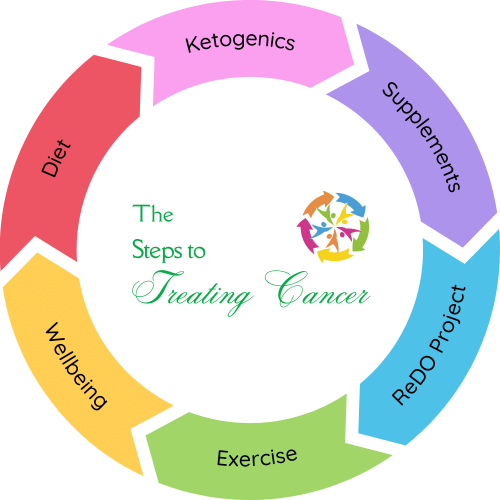Treating Cancer the Metabolic Way
Cancer is a complex and multifaceted disease that requires a comprehensive and integrative approach to treatment. At Metabolic Therapy, we believe in empowering individuals with the knowledge and tools they need to create their own personalised treatment plans.

N.E.D. (No Evidence of Disease)
Our approach, based on Professor Thomas Seyfried’s work, focuses on altering the metabolism of cancer cells, making them more vulnerable to treatment while supporting the overall health and well-being of the individual. By combining diet, ketogenics, supplements, repurposed drugs, exercise, and mental well-being, we aim to provide a holistic framework that individuals can use to guide their healing journey. We also emphasise the importance of finding healthcare professionals with the right credentials who are open to integrative and evidence-based approaches to cancer treatment. Join us as we explore the various components of metabolic therapy and how they can be integrated into a cohesive process for treating cancer.
An Overview of
Metabolic Therapy
Bringing the Steps Together
Metabolic therapy is an innovative approach to cancer treatment that focuses on altering the metabolism of cancer cells to make them more vulnerable to treatment. Unlike traditional therapies that target the cancer cells directly, metabolic therapy aims to disrupt the energy production pathways that cancer cells rely on for growth and survival.
Targeting Cancer Cell Metabolism
Cancer cells have an altered metabolism compared to normal cells. They rely heavily on glucose for energy through a process known as glycolysis, even in the presence of oxygen, a phenomenon known as the Warburg effect. Additionally, cancer cells also depend on glutamine for various metabolic processes. Metabolic therapy aims to exploit these dependencies by restricting glucose and glutamine availability and promoting alternative energy sources that cancer cells cannot efficiently use.
Press/Pulse Protocol
This protocol involves continuous metabolic stress (press) combined with acute interventions (pulse) to maximise the disruption of cancer cell metabolism. The press phase typically includes dietary restrictions and supplements. The pulse phase aims to reduce glutamine, another fuel source for cancer cells, and hit them with other metabolic stressors while they are weakened from the lack of fuel. Pulsing glutamine is also done during this phase to further disrupt cancer cell metabolism.
Targeting Cancer Cell Metabolism
The Press Phase of the Protocol
The press phase is a continuous and integral part of the protocol, designed to create sustained metabolic stress on cancer cells. This phase includes a combination of dietary restrictions, supplements, and other lifestyle interventions, as illustrated in the accompanying diagram. Each component plays a crucial role in maintaining the pressure on cancer cell metabolism, making them more vulnerable to subsequent acute interventions. The interconnected and cyclical nature of these elements is at the core of the holistic approach to disrupting cancer cell growth and survival.

Explore each section of the holistic cycle by clicking the buttons to learn more about the specific components of the press phase.
Acute Metabolic Interventions
The Pulse Phase of the Protocol
The Pulse phase of the Press/Pulse protocol involves implementing acute metabolic interventions to create short-term, intense stress on cancer cells. These interventions are designed to disrupt the metabolic processes that cancer cells rely on for growth and survival. By strategically applying these acute stressors, we aim to enhance the effectiveness of the sustained metabolic stress from the Press phase and further weaken cancer cells. The Pulse phase has an wide array of potential tools, but focuses on the following.
Pulsing Glutamine
Targeting glutamine with inhibitors, another fuel source for cancer cells, through specific interventions to further disrupt their metabolic processes.
Fasting
Periodic fasting to create acute metabolic stress, depriving cancer cells of nutrients and enhancing the effects of the ketogenic diet.
Metabolic Stressors
Utilising acute interventions, such as high-dose vitamin C, hyperbaric oxygen therapy, or targeted metabolic inhibitors, to create oxidative stress and disrupt cancer cell metabolism.
Rather than overwhelming you with everything that you could include as part of the Press/Pulse Protocol, we will keep this section short, encapsulating the essence of how this holistic approach to treating cancer works. We will create in-depth posts for the various elements of the Pulse in our blog.
Overview
Treating Cancer with Metabolic Therapy and the Press/Pulse Protocol.
This page provides a guide to treating cancer using metabolic therapy, an innovative approach that targets the metabolism of cancer cells. The Press phase includes sustained metabolic stress through diet, supplements, the ReDO Project, and exercise, while the Pulse phase involves acute metabolic interventions such as fasting, high-dose vitamin C, hyperthermia, photodynamic therapy, pulsing glutamine, and more. Together, these elements create a holistic and integrative approach to cancer treatment.
Targeted Approach
The Press/Pulse protocol specifically targets the metabolic vulnerabilities of cancer cells, making them more susceptible to treatment while minimising harm to healthy cells.
Holistic Integration
By combining diet, supplements, exercise, and acute interventions, the protocol supports overall health and well-being, addressing both the physical and mental aspects of cancer treatment.
Personalised Treatment
The flexibility of the Press/Pulse protocol allows individuals to tailor their treatment plans to their unique needs and circumstances, empowering them to take control of their healing journey.
Using the Press/Pulse protocol offers a comprehensive and integrative approach to treating cancer by targeting the metabolic vulnerabilities of cancer cells. By combining sustained metabolic stress with acute interventions, this protocol provides a powerful framework for individuals to create personalised treatment plans that support their overall health and well-being. At Metabolic Therapy, we are committed to empowering individuals with the knowledge and tools they need to take control of their healing journey. With the right approach and support, there is hope for a brighter and healthier future.








